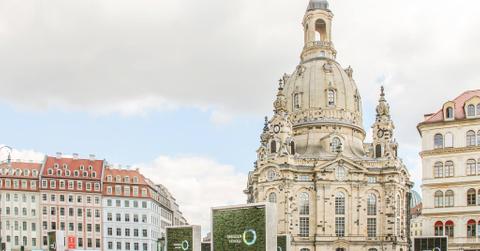This Moss Wall Can Clean As Much Polluted Air As A Small Forest
Cities around the world are more polluted than ever, but planting air-cleaning trees in cities can be difficult. One company has developed a solution: a mobile wall of moss with as much air-cleaning power as 275 trees.
Updated May 26 2019, 4:05 p.m. ET
Cities around the world are more polluted than ever. According to the World Health Organization, air pollution kills around seven million people each year, and the problem is most pronounced in cities. But what can be done about it? Aside from, for example, focusing on cleaner burning fuels for vehicles (car emissions make up a large portion of urban pollution), are there any quicker solutions?
One might think of planting more trees within city limits. Trees, after all, can eliminate particulates in the air, as well as convert CO2 into breathable oxygen. The trouble is, planting trees within city limits isn't always a viable option. For one thing, the biggest, leafiest trees tend to be the best for cleaning air, but such trees grow slowly and take up a lot of room. Roots are also a major problem. The healthier and older a tree is, the deeper and wider its roots will spread, busting asphalt, bricks, and concrete along the way.
But Brussels-based company Green City Solutions believes it has developed the perfect product to combat urban air pollution. A mobile wall of moss, measuring around 3.5 meters (about 3.8 yards), which they claim can clean as much urban air as 275 trees.
Why moss? According to Zhengliang Wu, co-founder of Green City Solutions, moss is simply better suited to the job. "Moss cultures have a much larger leaf surface area than any other plant. That means we can capture more pollutants."
"Citytree" is an impressive self-watering, self-monitoring, artistically-designed piece of green technology. According to the Green Solutions website, Citytree funtions to both clean and cool urban air. Just like real trees, Citytree "binds particulate matter, nitrogen oxides and CO2e and produces valuable oxygen. At the same time it cools the surrounding air."
Every Citytree comes with integrated technology which "collects, analyses and visualises data about the status and environmental performance of the CityTree." According to Wu, "[there are] pollution sensors inside the installation, which help monitor the local air quality and tell us how efficient the tree is." In other words, the benefits of each individual Citytree are easily measurable.
Citytrees come with automated internal watering tanks which collect rainwater, meaning that the large structures water themselves. For cities interested in installing Citytrees, not having to hire anyone to take on the burden of daily watering is bound to be a bonus.
Citytrees can even be customized, to a degree. They can be ordered with or without an attached bench, and optional protections against vandalism can be installed.
On the company's website, Green City Solutions does not shy away from speaking directly to what is bound to be a large portion of its customer base--property developers. It points out that, as many cities around the world are beginning to take action on air quality, by passing laws and entering into long-term clean air and energy commitments, Citytree may help property developers stay within certain clean air guidelines. Citytree may even help to raise the value of properties on which it is installed.
Around 20 Citytrees have been installed in cities around the world thus far, both indoors and out, at a cost of around $25,000 each. One problem that Citytree developers admit may be hampering their progress? The fact that getting polluted air in contact with their Citytrees is easier said than done. As Gary Fuller, an expert on air pollution at King's College London explained to CNN, "Even if you had a perfect air cleaner, getting the ambient air in contact with it is really hard." A lot of pollution, such as car exhaust, is dispersed almost entirely vertically, sometimes by miles.
But Green City Solutions is nothing if not detail oriented. Wu pointed out, "We intentionally pick spots where pollution is heavy due to traffic and air flow is limited. We are also testing a ventilation system to create our own air flow that gets the pollution to the tree."
As for the future of Citytree? According to Wu, hopes are high that some of the moss wall's technology could be integrated into new and existing buildings, as he explains, "We dream of creating a climate infrastructure so we can regulate what kind of air and also what kind of temperature we have in a city."
